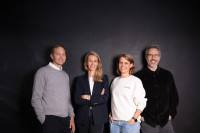Are Agencies the Better Consultants?
200 Zeichen Lorem ipsum dolor sit amet, consectetuer adipiscing elit. Aenean commodo ligula eget dolor. Aenean massa. Cum sociis natoque penatibus et magnis dis parturient montes, nascetur ridiculus mus. Donec quu.
Kim Notz
09. July 2024
When management and IT consultancies began acquiring agencies ten years ago, it sent a shiver through parts of the industry. Suddenly, alongside small and mid-sized agencies and established advertising holdings, new giants were entering the field. Just as ad agencies were getting used to competing with digital agencies — and had built digital expertise themselves — management consultants and IT service providers appeared on the scene.
The agency business model came under pressure. And that remains true today. The new competitors are only a symptom; the real cause is the digitalization of marketing. As a result, agency clients now need not only IT and digital know-how, but also organizational and process consulting — traditionally the domain of management consultants.
As creation, IT, and consulting increasingly overlap, the idea of offering everything from a single source seems obvious. And so agencies are building up expertise in marketing-related organizational and process consulting. Meanwhile, management consultants are making inroads into the field of marketing consulting.
In episode #115, I spoke with someone who has shaped this process from multiple sides of the table: Thomas Dmoch, since 2023 CMO of Schaeffler Bearings & Industrial Solutions. Today he sits once again on the client side, but he knows the other perspectives as well. Before joining Schaeffler, he was Head of Marketing at frog in Munich. Earlier, he had built the marketing consulting practice at Capgemini. He also spent many years in marketing at Volkswagen, Jaguar Land Rover, Škoda, and Renault Trucks.
During his time at Capgemini came the COVID-19 crisis, which triggered another wave of digitalization. As companies suddenly had to digitize overnight, Dmoch witnessed an interesting blending of agencies and consultancies. Where clients had once called their agencies first, consultants were soon brought in as well. What followed, as he describes it, was “raiding each other’s turf.”
Sobering Day Rates
The classic business models of agencies and consultancies are similar in that both rely on billable days and daily rates. From the consultants’ perspective, however, agency day rates have always been disappointing — as have the associated margins and target returns. Agencies, meanwhile, have been trying to command higher day rates in the consulting space than in their traditional business.
At KNSK, we began last year to move away from hourly and daily rates and instead introduce fixed prices for defined products. (A side note worth mentioning.)
Beyond the economic differences, there are also cultural divides between agencies and consultancies that surface sooner or later after acquisitions. Working style, professional background, and expectations differ significantly between consultants and agency people. Every acquisition is therefore followed by a challenging transition process.
Consultancies face a dilemma similar to that of major agency holdings, which also regularly acquire new shops. If integration is too rigid, culture, know-how, and ultimately the people themselves — the very assets acquired — are lost. On the other hand, without sufficient integration, they risk remaining little more than loosely connected holdings.
Collaboration between different agencies under the same roof then becomes difficult, since they often compete for the same slice of the pie and the holding company mainly manages by financial metrics. Collaboration ends up being punished rather than rewarded. For agency clients, this is frustrating too — they already spend a great deal of time coordinating multiple agencies.
This is where a model comes into play that builds on ideas from Wolf Ingomar Faecks and Ralf Nöcker outlined here: the “creative general contractor.” Similar to a creative lead agency, it takes responsibility for steering and coordinating the many specialists involved. The complexity of today’s customer journey, with its countless touchpoints, creates space for this agency archetype — one that can take weight off the shoulders of marketing departments.
Constant Overload
Marketing today suffers from constant overload. On the one hand, the pace has accelerated: marketing now operates practically in real time. On the other, the number of internal interfaces has increased — not only with sales and customer service, but also toward product. This calls for a competence that may sound dull from an agency perspective, but is taking on new significance: project management.
Agencies have always had to be good at project management in order to survive. But they are not used to managing the client and the client’s internal complexity as well. Traditional working methods — pitches, briefings, re-briefings, check-ins, presentations, and the good old account manager — get in the way. Agencies tend to cultivate their own ecosystem, but, as Thomas Dmoch sees it, they are far too detached from the client. By contrast, management consultants usually operate very close to the organization, its processes, and its key people.
The ability to manage projects enables agencies to steer the complex interplay of marketing, its interfaces, and touchpoints. The client side, too, now works much more project-based than in the past. Many activities are defined and managed as projects from the outset. If agencies were to offer a comprehensive package of project planning, coordination, organization, budget control, project communication, and risk management, they could carve out a real advantage.
Ultimately, this would shift the boundary between agency and client — as project management would also involve coordinating the client’s own employees and additional service providers. Add to this topics like stakeholder management and internal communication on the client side, which so far have played only a minor role in the traditional agency process.
An Extension of the Agency Business
A second type of agency that Thomas Dmoch sees as having strong potential is the creative data analyst. This type of agency is close to the end customer and has a full view of a company’s data assets. On one side sits the voice of the customer, on the other CRM and data analytics. A solid understanding of the target audience is the foundation for strong creativity and relevant content. This approach is not far removed from the traditional agency business, but rather an intelligent extension of it.
Dmoch is more skeptical, however, when agencies aspire to become creative management consultants. It’s a long road to operate at eye level with consultancies when it comes to organizational and process consulting. Building the necessary expertise in IT consulting is even more difficult if agencies want to compete with the big players in marketing technology.
One opportunity, however, lies in the potential emancipation from the big technology platforms. Adobe and Salesforce not only generate high costs for licenses and implementation, they also make differentiation in customer experience more difficult — since everything ends up looking the same. Here, agencies could score points by offering more individual, customized solutions.
Find more here:
Kontakt





